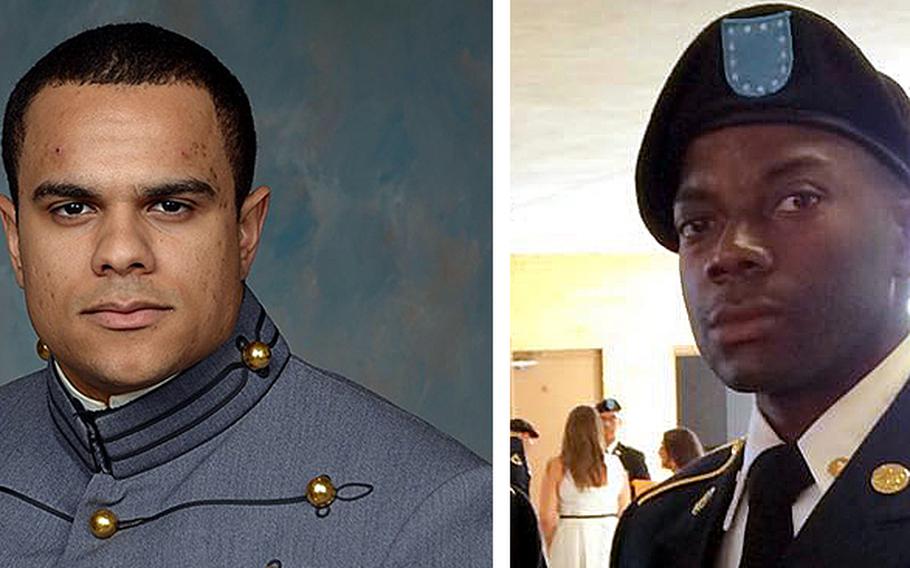
2nd Lt. Michael R. Parros, left, and Spc. Matthew R. Hester are two of three soldiers who died this past week during training. An unidentified soldier at Fort Jackson collapsed Thursday following a two-mile run and later died at the hospital. ()
Three soldiers have died in stateside training this week, the Army said Friday. A soldier in Ranger school died Wednesday at Fort Benning, Ga., and another died Thursday at Fort Jackson, S.C.
On Wednesday, 2nd Lt. Michael R. Parros, 21, died, two days after his first day of Ranger School at Fort Benning. An Army release said the West Point graduate had been hospitalized with hyponatremia, abnormally low sodium levels in the blood typically linked to excessive water intake. It can be aggravated by other factors, according to the Mayo Clinic. Ranger School is designed to push soldiers to physical and mental limits in a grueling, 61-day course.
A soldier at Fort Jackson collapsed Thursday following a 2-mile run at the end of his physical fitness test and later died at the hospital, base spokesman Patrick Jones said. The name of the soldier has not been released, and the incident is under investigation.
That death is at least the second this week linked to a severe reaction following a morning physical training run. Spc. Matthew R. Hester, 28, died at Fort Carson, Colo., on Monday, shortly after he collapsed, the Army said. Hester, a combat medic, was assigned to the 3rd Armored Brigade Combat Team of the 4th Infantry Division.
Investigations into the deaths are ongoing; record heat levels in many parts of the country could have been a factor.
The high in Fort Benning was 95 degrees Monday, with the heat index at 103 degrees, according to the National Weather Service.
“Heat is always in play here this time of year,” Army spokesman John Tongret said of Fort Benning. “I hate to speculate and say heat was a part of it, but I certainly couldn’t argue against it, either. That said, we are not 100 percent certain this was a heat-related injury,” Tongret told the East Bay (Calif.) Times. Parros was from Walnut Creek, Calif.
More than 200 soldiers have experienced heatstroke in each of the past five years, said Maj. David DeGroot of the Army Public Health Center in an Army handout cautioning the effects and dangers of training in hot conditions.
Officials at posts vulnerable to high temperatures, mostly in the south, have regulations to curb heat causalities, said John Boyce, an Army Forces Command spokesman. Commanders typically hold ceremonies and other prolonged events in the morning to avoid high temperatures, he said.
“We take every death seriously and look into the circumstances to determine what may be done to avoid them in the future, for both their families and other soldiers,” Boyce said.
Officials at the Army’s Combat Readiness Center at Fort Rucker, Ala., launched a team to lead the investigation of Parros’s death, said Michael J. Negard, a spokesman with the center. The center provides investigative resources to determine how accidents resulting in deaths or heavy financial or equipment losses have occurred. The findings occasionally are sent up to the Pentagon for review of force-wide changes, Negard said.
As of Friday, the center had not received requests from commanders at Fort Carson or Fort Jackson to activate a team to look into recent deaths there, he said.
horton.alex@stripes.com Twitter: @AlexHortonTX